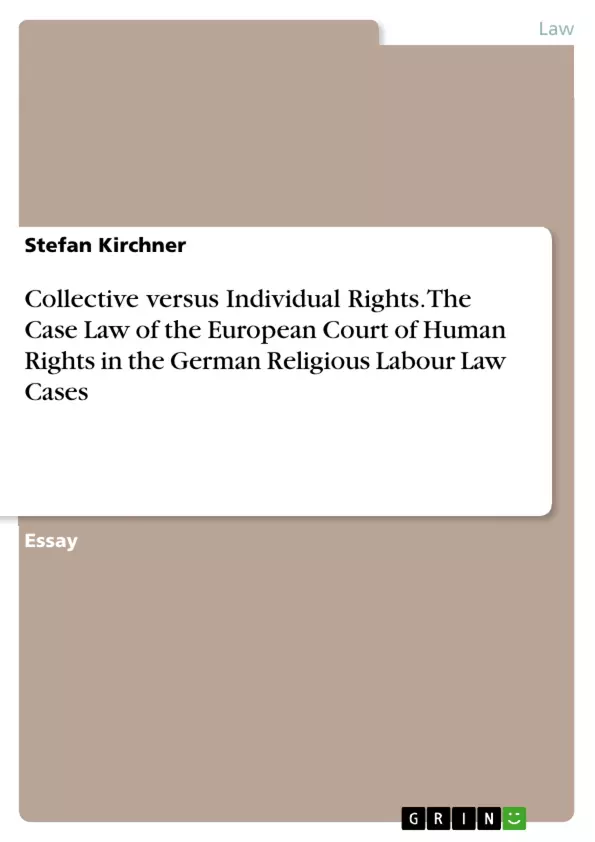Religious organizations which operate hospitals, kindergartens and other institutions are important employers. This is particularly the case in Germany, where institutions related to Christian groups, including the united evangelical regional churches and the Catholic church are the second most important employer after the public sector.
At the same time is there a sense of increased secularization. This can lead to situations in which employees, while willingly employed by a religiously motivated organization, openly defy key rules of this religious group, e. g. when it comes to issues such as divorce or homosexuality.
In the last years, a number of cases have made it through the court system in Germany and eventually to the European Court of Human Rights. By looking at some of these cases and the wider case law of that Court, this article is aimed at providing the reader with an overview over the topic but also with an answer to the question how the European Convention on Human Rights, which allows for a wide range of legal models concerning the relationship between the state and organized religions.
Inhaltsverzeichnis (Table of Contents)
- Introduction
- Community and Loyalty
- Valid Employer Expectations of Employee Loyalty
- Private Life vs. Freedom of Religion?
- Concluding remarks
Zielsetzung und Themenschwerpunkte (Objectives and Key Themes)
This article aims to provide an overview of the European Court of Human Rights' case law regarding the relationship between freedom of religion and individual rights in the context of religious organizations as employers, particularly in Germany.
- The balance between individual and collective rights in the context of religious freedom
- The European Convention on Human Rights' interpretation of employee loyalty in religiously motivated workplaces
- The role of the state in regulating the relationship between religion and employment
- The scope of employer expectations regarding employee conduct and beliefs in relation to the employer's religious ethos
- The impact of secularization on the relationship between religious organizations and the state
Zusammenfassung der Kapitel (Chapter Summaries)
- Introduction: This chapter introduces the context of the article, discussing the diversity of relationships between the state and organized religion across Europe and highlighting the specific case of Germany, where religious organizations are significant employers. It also introduces the concept of the collective dimension of freedom of religion in Germany.
- Community and Loyalty: This chapter examines the European Court of Human Rights' case law on the concept of employee loyalty in the context of religious organizations as employers. The Court has upheld the right of religious employers to impose certain restrictions on employee conduct and beliefs, recognizing the importance of protecting the collective rights of religious communities.
- Valid Employer Expectations of Employee Loyalty: This chapter further explores the Court's jurisprudence on employee loyalty, focusing on the expectation that employees are aware of the religious ethos of their employer when entering into a work contract. The chapter emphasizes the importance of respecting the collective freedom of religion enjoyed by religious organizations while acknowledging the individual rights of employees.
Schlüsselwörter (Keywords)
This article focuses on the intersection of religious freedom, human rights, and employment law, particularly within the context of religious organizations as employers in Germany. Key themes include collective rights, freedom of religion, employee loyalty, secularization, and the European Convention on Human Rights.
- Quote paper
- Dr. Stefan Kirchner (Author), 2015, Collective versus Individual Rights. The Case Law of the European Court of Human Rights in the German Religious Labour Law Cases, Munich, GRIN Verlag, https://www.hausarbeiten.de/document/300808


